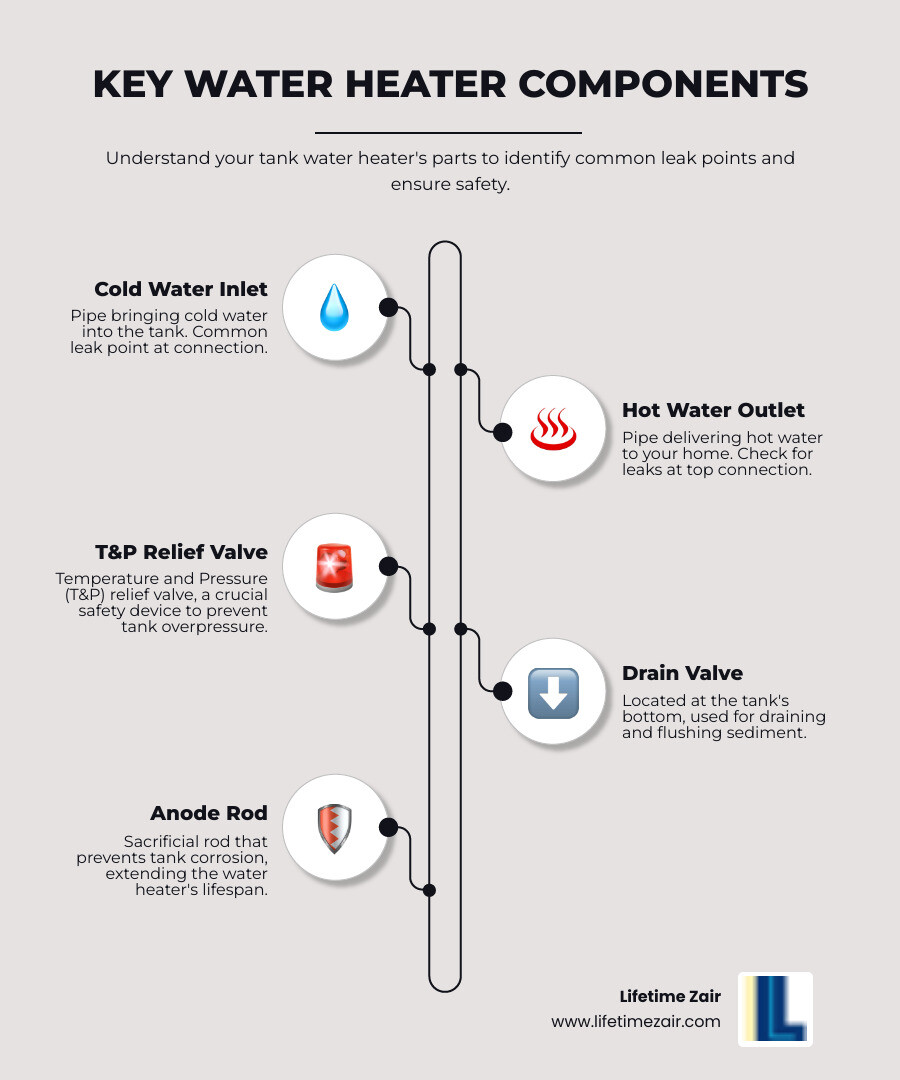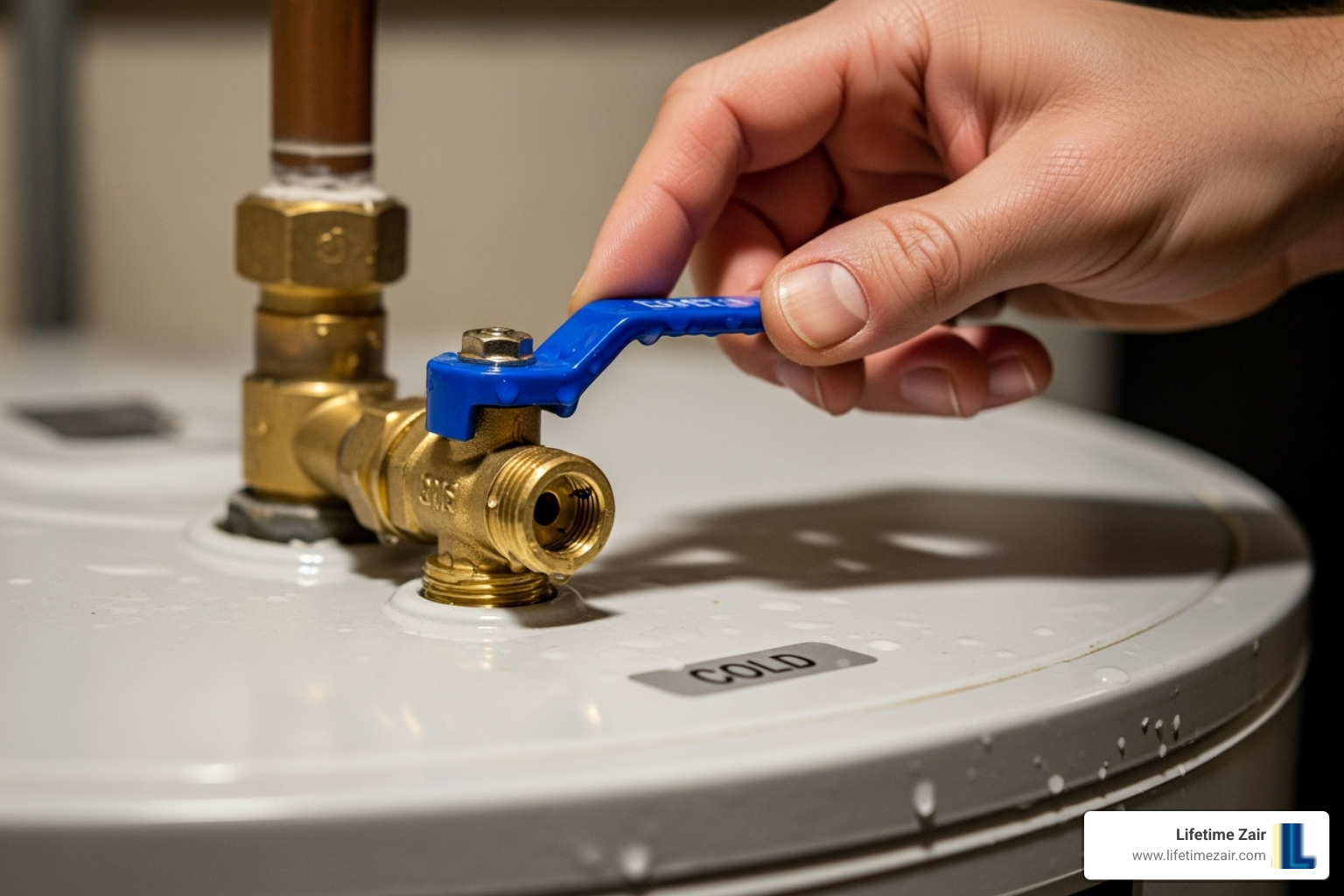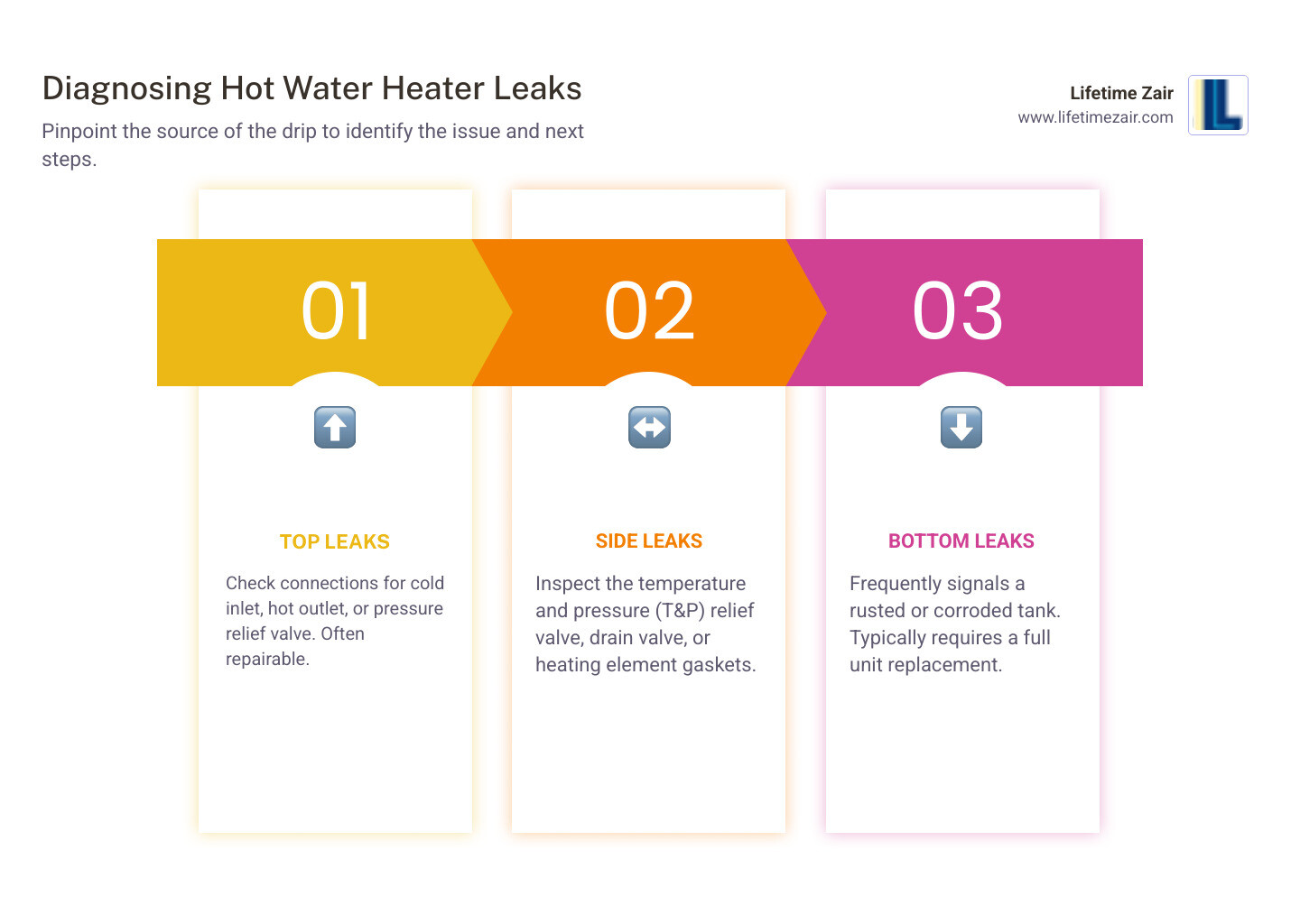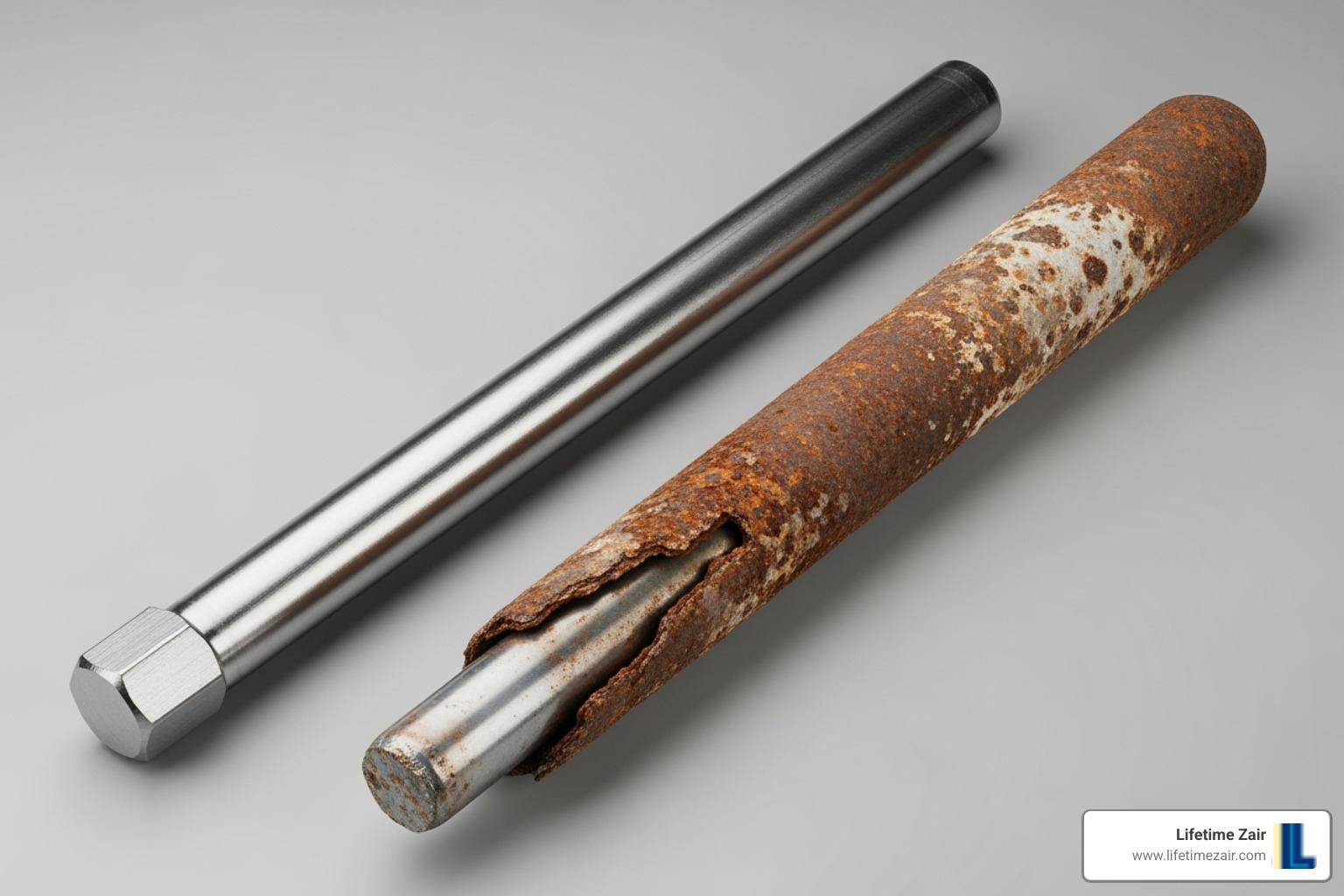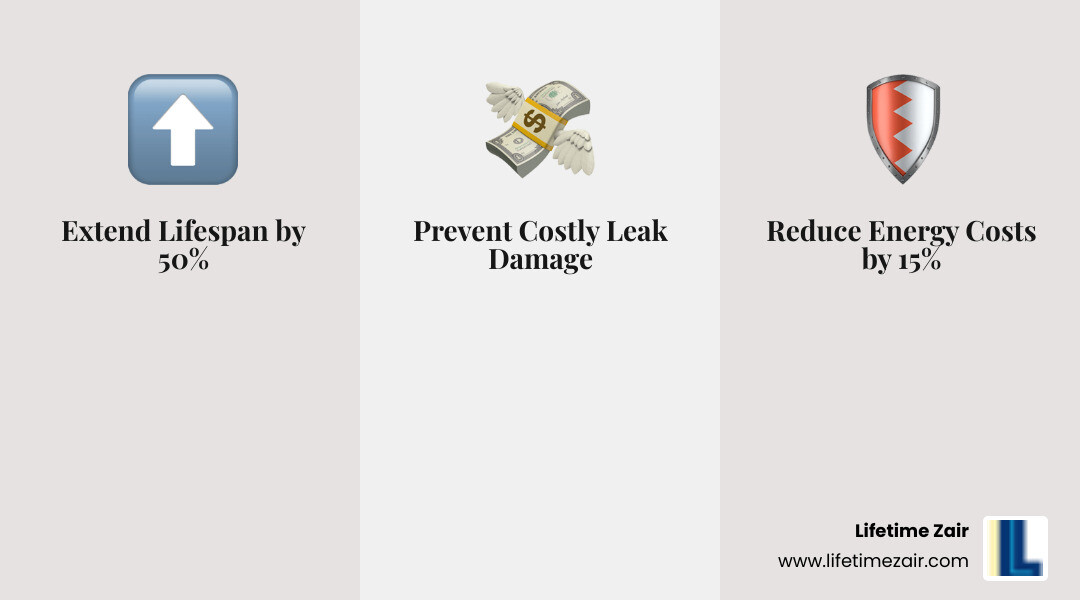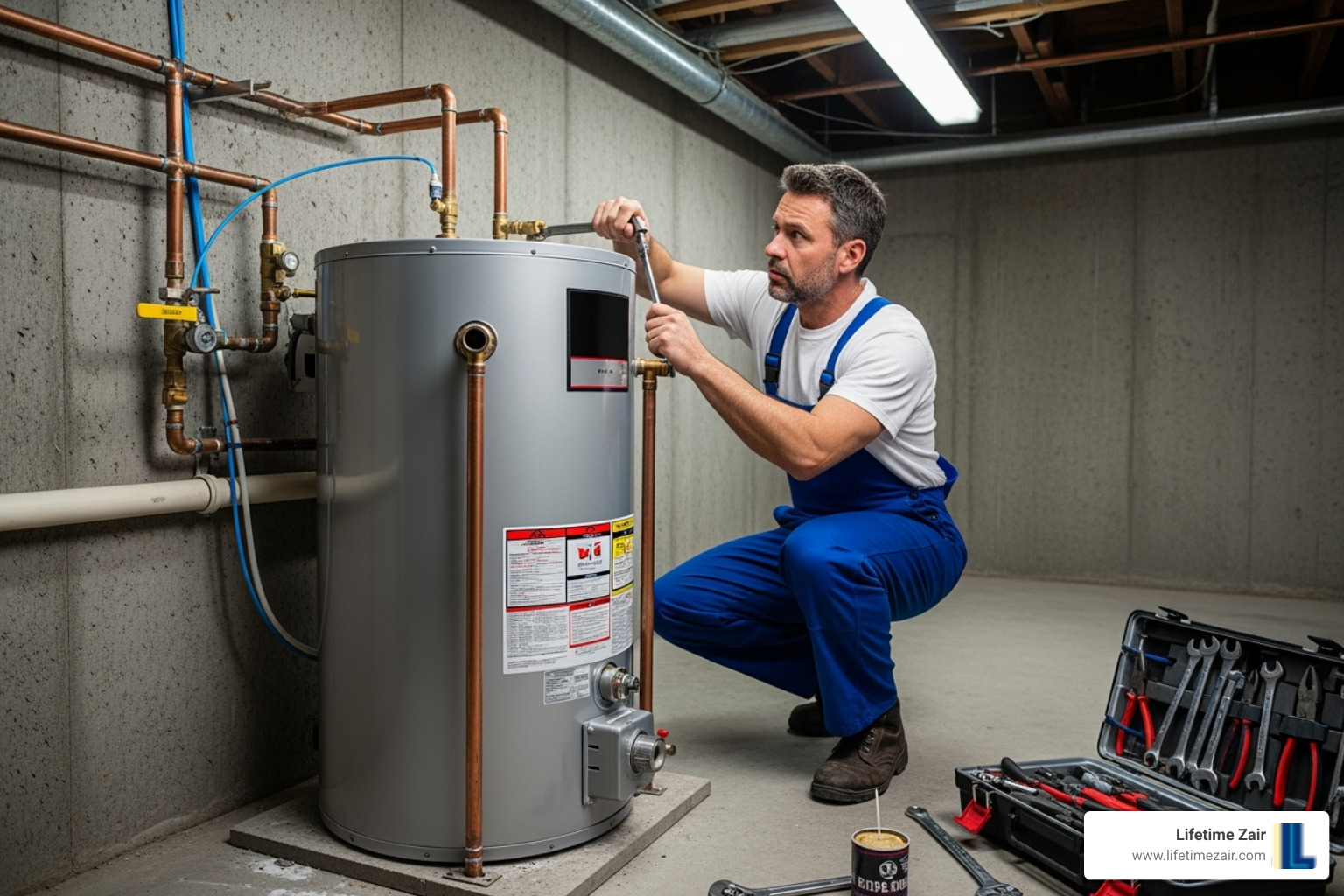Why Acting Fast on Water Heater Issues Saves You Money
Hot water heater leaking is one of the most common household emergencies that can quickly turn from a small puddle into thousands of dollars in water damage. Whether you’re dealing with a few drops or a steady stream, understanding what to do next can save your floors, walls, and wallet.
Quick Action Steps for a Leaking Water Heater:
- Turn off the power – Gas valve to “off” or flip the circuit breaker
- Shut off water supply – Close the cold water inlet valve above the heater
- Identify the leak location – Top (pipes/fittings), side (relief valve), or bottom (tank/drain valve)
- Assess severity – Minor drip vs. major leak determines next steps
- Call for help if needed – Gas lines, electrical work, or tank replacement require professionals
Water heaters typically last 8-12 years, but leaks can happen at any age. The good news? Many leaks are fixable with basic tools and some know-how. The key is acting quickly and staying safe.
Common signs your water heater is leaking include:
- Pooling water around the base
- Rust stains on the tank or floor
- Unusual hissing or dripping sounds
- Inconsistent hot water temperature
- Musty or metallic odors near the unit
A small leak today can become a flooded basement tomorrow. But with the right approach, you can often diagnose the problem, make simple repairs, and know when it’s time to call in the pros.
What to Do Immediately When You Find a Leak
Finding a hot water heater leaking is stressful, but panicking won’t help. The priority is keeping your family safe and preventing further damage. A leaking water heater is an emergency because water spreads quickly, leading to serious damage, mold growth, and potential electrical hazards. Let’s walk through the steps.
How to Safely Shut Off Power and Water
Safety first. Before doing anything else, cut off the power and stop more water from flowing into the tank.
- For electric water heaters, find the labeled breaker in your circuit panel (often a double breaker) and flip it to “OFF”.
- For a gas water heater, turn the gas shut-off valve on the gas line to “OFF”. If you’re unsure, turn off your home’s main gas supply.
Next, shut off the water. Find the cold water inlet valve on top of the heater and turn it clockwise until it stops. This prevents more water from entering the tank. If you can’t reach the valve or the leak is severe, shut off your home’s main water shut-off valve, typically located where the main water line enters the house.
Once power and water are off, you’ve prevented a bigger disaster. For other warning signs, our guide on Signs you need a water heater repair can help.
Is It a Leak or Just Condensation?
First, ensure you’re dealing with a leak and not condensation, which is common in humid weather or cold basements.
Use the simple wipe test: Dry the water heater and floor completely. Wait a few hours and check for new moisture. Real leaks are persistent and localized, while condensation is more uniform and temporary.
- Gas water heaters, especially high-efficiency models, can produce condensation during normal operation. If the area stays dry after wiping it down, it was likely just condensation.
- Electric water heaters may show condensation evenly across the tank’s surface, especially in a cold room after heavy hot water use. Ambient temperature and humidity are key factors.
Also, check nearby pipes and appliances. A leak from your HVAC or furnace can mimic a water heater leak. Use paper towels to isolate the source of the moisture.
Diagnosing a Hot Water Heater Leaking: Top, Side, or Bottom?
With everything shut down and condensation ruled out, it’s time to find the leak’s source. The location of the hot water heater leaking—top, side, or bottom—reveals the likely problem and solution, from loose pipe connections to a faulty valve or a more serious tank problem.
Grab a flashlight to check pipe fittings, valves, gaskets, and the tank integrity. You don’t need to be a plumber to spot most of these.
Leaks from the Top of the Water Heater
Good news: A leak from the top is usually a fixable problem and rarely means the tank itself has failed. Common culprits include:
- Cold water inlet/hot water outlet: These connections can loosen over time. A gentle tightening with a pipe wrench may fix it, but don’t overtighten.
- Anode rod port: The connection for the sacrificial anode rod can leak. Rusty tap water is another clue.
- Temperature and Pressure (T&P) valve threads: The threads where the T&P valve connects at the top can leak. Re-sealing with Teflon tape and re-tightening can often fix this.
If your water heater is making strange noises along with leaking, see our guide on Resolving Water Heater Noises in Carrollton.
Leaks from the Side
A side leak often points to the Temperature and Pressure (T&P) relief valve. A constantly dripping T&P valve indicates a problem, such as high water pressure (over 150 PSI) or temperature (above 120°F). The valve itself could also be faulty and need replacement. Never ignore a leaking T&P valve; it’s a critical safety component.
On electric models, also check the heating element gasket. These gaskets seal the heating elements and can crack or loosen over time, causing leaks.
Immediate Steps for a Hot Water Heater Leaking at the Bottom
Bottom leaks can be serious, but sometimes they have an easy fix. First, check the drain valve. It might be loose or not fully closed. Try gently tightening it. If it’s blocked by debris, it may need replacement. A brass garden hose cap can serve as a temporary fix.
Unfortunately, if the leak isn’t from the drain valve, you’re likely dealing with a cracked tank due to internal tank corrosion. Signs of a cracked tank include water seeping from the tank base, rusty hot water, and an age over 10-12 years. A cracked tank cannot be repaired and requires replacement. For more help, see this resource: Water Heater Leaking from Bottom (What to Do).
Repairs involving gas or electricity are best left to professionals.
Proactive Maintenance: How to Prevent Leaks
Regular maintenance is the best way to prevent a hot water heater leaking. It can extend your unit’s lifespan and help you avoid unexpected puddles. While most heaters last 8-10 years, proper care can extend that to 20 years.
Key Maintenance Tasks and Schedule
We recommend performing these maintenance tasks annually to keep your water heater in top shape:
- Flushing the Tank: Annually flush the tank to remove sediment buildup, which can cause overheating and leaks. Turn off power and water, connect a hose to the drain valve, and run water until it’s clear. For a visual guide, see How to flush your water heater tank.
- Anode Rod Inspection and Replacement: The “sacrificial” anode rod corrodes to protect your tank. Inspect it every few years and replace it every 3-5 years, or more often in areas with hard water, to prevent tank corrosion.
- T&P Valve Testing: Test this critical safety device annually. Lift the lever for a few seconds. If water doesn’t flow or continues to flow after release, the valve must be replaced immediately.
Regularly inspecting connections also helps catch small drips early. These tasks prevent many issues that cause a hot water heater leaking. For more indicators, see Signs its time for water heater repair.
Preventing a Future Hot Water Heater Leaking Problem
Beyond routine maintenance, there are a few other steps we can take to proactively protect our water heaters and plumbing system from leaks:
- Manage Water Pressure: High water pressure (above 80 psi) stresses your plumbing and can cause leaks. Ideal pressure is 50-60 psi. A pressure-reducing valve (PRV) can regulate high pressure.
- Install an Expansion Tank: In a closed plumbing system (with a PRV), heated water expands and creates high pressure. An expansion tank absorbs this pressure, protecting your water heater and preventing leaks.
- Consider a Water Softener: In areas with hard water, a water softener reduces mineral buildup, which causes corrosion and shortens your water heater’s lifespan.
- Install a Water Sensor Alarm: Place an inexpensive water sensor alarm near your water heater. It will sound an alarm at the first sign of moisture, giving you an early warning to prevent major damage. You can find options to Install a water sensor alarm.
Repair or Replace? Making the Right Call
When your hot water heater leaking, the big question often becomes: can we fix it, or is it time for a new one? This decision hinges on several factors, including the age of your unit, the cost of the repair, the frequency of past issues, and your desire for improved energy efficiency. We understand that this can be a tough choice, and we’re here to help you weigh your options.
When to Repair
Not every leak spells the end for your water heater. Many common issues are quite fixable:
- Loose Fittings: As we discussed, leaks from the cold water inlet, hot water outlet, or even the drain valve can often be resolved by simply tightening connections.
- Faulty T&P Valve: A T&P valve that constantly drips or fails during testing can be replaced. This is a relatively straightforward repair that restores a critical safety feature.
- Leaking Drain Valve: If the drain valve itself is the source of the leak, it can be replaced without replacing the entire unit.
- Young Water Heater: If your water heater is relatively young (under 8 years old) and the leak is from an external component or a replaceable part, repair is usually the most cost-effective option. It makes sense to invest in a repair if the unit still has many years of expected life left.
When to Replace
Unfortunately, some leaks are a clear signal that it’s time for a new water heater.
- Internal Tank Corrosion: This is the big one. If water is seeping from the bottom of the tank, and you’ve ruled out the drain valve, it almost certainly means the internal tank has corroded and cracked. This cannot be repaired, and the only solution is a full replacement.
- Unit is Over 10-12 Years Old: Water heaters generally last between 8 and 12 years. As they approach or exceed this age, components deteriorate, and the risk of internal corrosion increases significantly. Frequent repairs on an older unit can quickly add up, making replacement a more economical choice in the long run.
- Frequent or Costly Repairs: If you find yourself constantly calling for repairs, or if a single repair is going to cost a significant portion of what a new unit would, it’s often wiser to replace.
- Desire for Higher Efficiency: New water heaters are far more energy-efficient than older models, especially if you consider upgrading to a tankless system or a modern tank model with better insulation. While the upfront cost is higher, the long-term energy savings can be substantial.
The choice between repairing a hot water heater leaking and replacing it often comes down to a cost-benefit analysis. For a deeper dive into making this decision, especially if you’re facing other major appliance repairs, read our article: Are you stuck with a broken furnace or water heater repair or replace?.
Frequently Asked Questions about Water Heater Leaks
Dealing with a hot water heater leaking is stressful and brings up many questions. Here are answers to the most common concerns.
What is the typical lifespan of a water heater?
Standard tank-style water heaters typically last 8 to 12 years, while tankless water heaters can last up to 20 years. Several factors affect this lifespan, including water quality and maintenance. Hard water causes mineral buildup that can shorten the unit’s life, while regular maintenance like annual flushing can help it reach or exceed its expected lifespan.
When is a water heater leak considered an emergency?
A leak is an emergency in these situations:
- Significant water flow: A steady stream or gushing water that can cause rapid flooding.
- Leak from the tank body: Water seeping from the tank itself indicates a failure and requires immediate attention.
- Signs of extreme pressure: Hissing or whistling noises combined with a leak can signal dangerous pressure buildup.
- Proximity to electrical components: A leak near wiring or outlets is a serious safety hazard.
When should I call a professional plumber for a leak?
While DIY can be rewarding, call a professional in these cases:
- You feel uncomfortable or unsure about any part of the repair.
- The work involves gas lines or electrical components.
- The unit needs a full tank replacement.
- You can’t find the leak’s source.
For homeowners across North Texas, from Addison to McKinney, our team at Lifetime Zair has seen every type of hot water heater leaking situation. We can quickly assess the problem, explain your options, and help you make the best decision for your home and budget.
Conclusion
When you find a hot water heater leaking, it’s natural to feel that initial wave of panic. But as we’ve walked through together, you now have the knowledge and confidence to tackle this common household challenge head-on.
The key is always safety first – shutting off power and water before you do anything else. From there, your detective work begins. Is it really a leak, or just condensation playing tricks on you? Where exactly is the water coming from – the top connections, that critical T&P valve on the side, or the more concerning bottom area?
DIY diagnosis can absolutely save you both time and money, especially when dealing with simple fixes like loose fittings or a faulty drain valve. But we can’t stress enough how important it is to recognize your limits. Gas lines, electrical components, and tank replacements are jobs for the professionals – there’s no shame in making that call.
Here’s what we hope you’ll take away from this: regular maintenance is your best friend. That annual tank flush, checking your anode rod every few years, and testing your T&P valve – these simple tasks can add years to your water heater’s life and help you avoid those stressful midnight leak findies.
When you’re facing that tough decision between repair and replacement, age matters. A young water heater with a simple leak is worth fixing. But an older unit that’s constantly giving you trouble? Sometimes a new, energy-efficient model is the smarter long-term investment.
At Lifetime Zair, we get it – dealing with home repairs shouldn’t break the bank or add unnecessary stress to your life. That’s why we offer maintenance plans and financing options to help homeowners throughout North Texas keep their essential systems running smoothly. Whether you’re in Dallas, Denton, Southlake, or Sachse, we’re here when you need us.
Don’t let a hot water heater leaking turn into a major headache or costly water damage. Sometimes the best peace of mind comes from knowing you have experts just a phone call away. For expert water heater repair service in Carrollton, TX, contact our team today!

